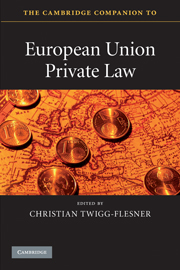Book contents
- Frontmatter
- Contents
- Preface
- List of Contributors
- Table of cases
- Table of legislation
- 1 Introduction
- 2 The historical evolution of European private law
- 3 European private law and the comparative method
- 4 The role of the conflict of laws in European private law
- 5 Competence and European private law
- 6 Language and terminology
- 7 European private law by directives
- 8 The European Court of Justice as a motor of private law
- 9 European contract law
- 10 The way forward in European consumer contract law
- 11 Commercial contracts and European private law
- 12 European tort law
- 13 European Union property law
- 14 Information obligations and withdrawal rights
- 15 Travel law
- 16 Unfair contract terms
- 17 Unfair commercial practices and European private law
- 18 Consumer sales and associated guarantees
- 19 Product liability
- 20 Commercial agency in European Union private law
- 21 EU competition law and European private law
- 22 Non-discrimination and European private law
- 23 Financial services in European Union private law
- Further reading
- Index
5 - Competence and European private law
Published online by Cambridge University Press: 05 July 2015
- Frontmatter
- Contents
- Preface
- List of Contributors
- Table of cases
- Table of legislation
- 1 Introduction
- 2 The historical evolution of European private law
- 3 European private law and the comparative method
- 4 The role of the conflict of laws in European private law
- 5 Competence and European private law
- 6 Language and terminology
- 7 European private law by directives
- 8 The European Court of Justice as a motor of private law
- 9 European contract law
- 10 The way forward in European consumer contract law
- 11 Commercial contracts and European private law
- 12 European tort law
- 13 European Union property law
- 14 Information obligations and withdrawal rights
- 15 Travel law
- 16 Unfair contract terms
- 17 Unfair commercial practices and European private law
- 18 Consumer sales and associated guarantees
- 19 Product liability
- 20 Commercial agency in European Union private law
- 21 EU competition law and European private law
- 22 Non-discrimination and European private law
- 23 Financial services in European Union private law
- Further reading
- Index
Summary
Private law and the constitutional limits of EU competence
Article 5(1) EC [Article 5 TEU] provides that the EU shall act within the limits of the powers conferred upon it by the Treaty and of the objectives assigned to it therein. There is no competence to be found in the Treaty which confers any general authorisation on the EU to operate in the field of private law. There are, however, particular legal bases that can feasibly be exploited to adopt legislation that touches private law. One is found in Article 153(3)(b) EC [Article 169(2)(b) TFEU], which provides that the Community may adopt measures which support, supplement and monitor the policy pursued by the Member States in order to promote the interests of consumers and to ensure a high level of consumer protection. This was an innovation of the Treaty of Maastricht, so it has been available as a legislative competence only since 1993. Judicial cooperation in civil matters may be pursued by reliance on Articles 61–65 EC [Articles 67–81 TFEU] as a basis for legislation. This has a pedigree in the EC Treaty which goes back only as far as the Treaty of Amsterdam, so the key date here is 1999. Both legal bases have been employed sporadically for the making of legislation affecting private law. But in neither case has anything of radical significance emerged.
Yet ‘EU private law’ – most of all ‘EU contract law’ (of a sort) – was already envisaged by the Treaty of Rome when it came into force in 1958. EU competition law intimately affects private law, for Article 81 EC [Article 101 TFEU] requires that contracts which fall foul of its demands be treated as void. The Treaty rules governing free movement affect private law insofar as they have been interpreted as capable of direct application to the activities of private parties – this is especially true of those concerning the free movement of persons (Bosman (Case C-415/93); Angonese (Case C-281/98)). Also gender equality rules (Defrenne v. SABENA (Case C-43/75)) and, more recently, the wider equality rules covering, inter alia, race and sexual orientation have an important impact on private relations. There is even a general principle of EU law prohibiting discrimination on grounds of age which is capable of application in cases involving exclusively private parties (Mangold (Case C-144/04)).
- Type
- Chapter
- Information
- The Cambridge Companion to European Union Private Law , pp. 58 - 69Publisher: Cambridge University PressPrint publication year: 2010
- 4
- Cited by

